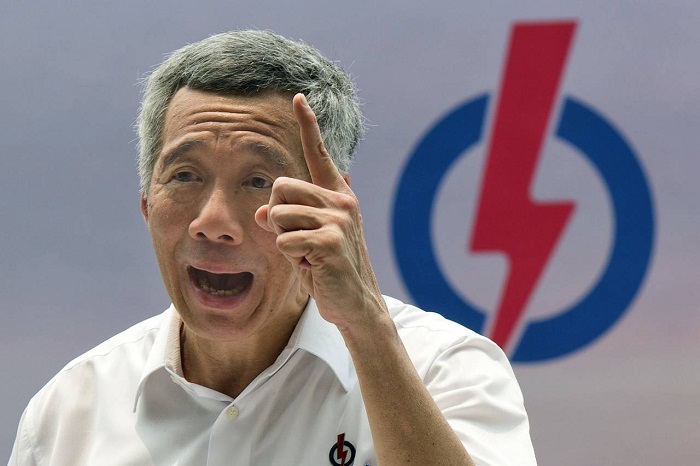Prime Minister Lee Hsien Loong is hoping to reverse a setback at the 2011 election, when his party received a record-low 60.1% share of the popular vote, though it held on to 81 of the then 87 parliamentary seats. Discontent over the government’s immigration policies and the rising cost of living in Singapore, one of the world’s most expensive cities, contributed to the PAP’s fall in vote share. These issues have continued to dominate political discussion here, and a slowing economy has added to pressure on Mr. Lee’s administration.
Since the previous election, the government has responded by restricting the influx of foreign labor, lowering housing costs and improving social safety nets. The PAP is campaigning on its economic record of the past four years, which has included additional medical and housing benefits, especially for the elderly. The government has said that a strong mandate will help the country weather global economic uncertainty affecting Singapore, whose economy is largely driven by overseas demand.
On a hazy election day in the city, which was also a public holiday, voters were pouring in to polling stations around late morning. Many wore face masks to guard against the effects of the haze.
Wong Siew Chen, 86 years old, arrived on a wheelchair with her daughter helping her along. Ms. Wong said she had voted in almost all Singapore’s elections and was still excited to vote. Asked if she thought this year’s vote was special, she said it was an “important” election, according to comments translated by her daughter. Some 2.1 million Singaporeans had cast their votes at 832 polling stations by early evening, the country’s elections department said.
Almost no one thinks the PAP, led by Mr. Lee, risks losing the election. But many political analysts agree that the party’s hold on power is softening as economic growth slows—the economy grew 1.8% in the second quarter from a year earlier, the weakest level in nearly three years—and opposition groups gain clout. The government has downgraded its growth forecast to 2% to 2.5% this year, from an earlier prediction of 2% to 4%.
Mr. Lee presented his party in this election as a safe and successful pair of hands that had built modern Singapore. Mr. Lee is the son of Lee Kuan Yew, the revered former leader who was Singapore’s first prime minister and transformed the new nation from a poor, former colonial trading port beset by racial tensions into one of the world’s wealthiest societies.
The prime minister arrived at a polling station shortly before midday along with his wife, Ho Ching. After casting his vote, he waved to the cameras and shook hands with supporters. “It’s a major turning point for Singapore,” Mr. Lee told reporters. “I think we have had some impact…and I think we have [gotten] our messages across.”
Singapore’s opposition groups remain fragmented, and no single figure has emerged as a genuine rival to PAP’s dominance. Still, nine parties competed in the vote, up from seven in 2011, and for the first time opposition parties contested all 89 seats in Parliament. Election surveys and exit polls are illegal in Singapore during the campaign period and the country lacks a political-polling culture, making it difficult to predict results.
About 50 voters, mostly elderly, were among the first to enter a polling booth in the city center. Many were happy to flash their identification cards and voters’ slips to a scrum of waiting media.
One voter who gave his name only as Chang said he was happy to see a choice of so many parties in the election. “Earlier, we just listened, now we can talk,” he said, citing immigration, cost of living and social security as his main concerns.
Sylvia Lim, chairwoman of Singapore’s largest opposition group, the Workers’ Party, urged voters in the lead-up to the election not to stick with the PAP. “Do you want to be stuck with no choice? It is up to you. You must play your part to build an alternative to the PAP so that Singaporeans can embrace the future with confidence and without fear,” she told a campaign rally.
Something of a generational gap has emerged in electoral politics here. Mr. Lee’s party has governed uninterrupted since independence and gains much of its support from older voters, while some younger voters—many of whom weren’t alive during Singapore’s meteoric economic rise—reject the PAP’s dominance and are being drawn to opposition groups.
Among the opposition parties contesting the election, only the Workers’ Party had a presence in the previous Parliament. It won six seats in 2011 and one more in a by-election in 2013. This election it fielded 28 candidates and campaigned on proposals to nationalize public transport and limit the number of foreign workers. Opposition parties in Singapore, including the Workers’ Party, have tended to pitch themselves to voters as offering a check and balance to the PAP’s power in Parliament, rather than directly challenging its grip.
Singapore’s political system is based loosely on Britain’s first-past-the-post voting method, in which the candidate with the most votes in a constituency gains a seat in Parliament. In addition to single-seat constituencies, the country’s electoral boundaries include group representation constituencies, or GRCs, in which voters choose from a team of four to six candidates from the same party. The party with the most votes takes all the seats in that GRC.
More about:
















































